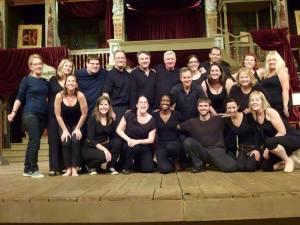Urban.
At-risk.
Ghetto.
Low-income.
Unmotivated.
Minority.
Underserved.
Many adjectives—ranging from scholarly to colloquial—describe the student population with which I work. The irony is not lost on me—an English teacher, a lover of language, an inquisitive tour guide of qualifier words—that those I serve are oppressed by those very adjectives I teach. However, I favor different adjectives to describe them: inspiring, beloved, undeterred, curious, growing, resilient, influential. Whether I stand in front of them, sit among them, or learn alongside them, the haunting ubiquity of negative adjectives underlies my own personal mission of social justice: empowering my students through the tools of language and learning to challenge the system on their unique journey to success. For these reasons I humbly ask for an E-SU Scholarship to study at a British institution.
Since daily I strive to facilitate both the learning and subversion of adjectives used against my students, the glorious burden of education weighs heavily on my mind. It is my students’ understanding and application of language that will allow them the choice and ability to climb the ladders out of the bleak fate of their neighborhood. Social and economic mobility is—after all—why so many of their parents risked the many perils associated with immigration to America. I recognize that my instruction in the intricate and inspiring English language—from the letter to the law—authorizes my students to question their current status, as well as to eloquently envision a future that is earned by them, rather than predetermined by the defeating presence of decrepit corner stores and the stereotypical gaze of onlookers. The first step to advocacy is to define and articulate the end goal for which one advocates. This is why I teach high school English; I teach to empower, to nourish students with the language they long for to criticize their current situation and as well as delineate a different future. These opportunities for my students harkens to Hamlet’s meta-play: with the intention of revealing Cladius’ guilt, he writes a new outcome in the plot; this play within a play signifies how power lies in the ability to use language both playfully and powerfully. I teach to give my students both play and power.
In addition to the power of language, daily I strive to model for my students a passion for learning. Asking questions, admitting mistakes, writing alongside of them, authentically paying attention to their literary insights…all these intentional moves on my part ensure that my classroom is truly a learning community, not a hierarchy. Modeling a personal quest for knowledge as an adult learner is essential since I teach seniors. Their next step is the “real world,” a world full of opportunities if only they view their contexts as such. In my displays as a learner, I hope to instill in them a vigorous way of negotiating with the world around them—the good, the bad, the neutral.
In countless ways, the experience I am asking you to help me gain is a pivotal moment in my quest to give my students the power of language and learning. Spending three weeks of my summer “going to school” is exactly the kind of message I want to send to my students…that even though the school calendar year has found its end, my learning journey has not.
However, being a perpetual learner is not the only message I want to send to my students; I hope to grow in my content competence as well. By studying at a prestigious British university, discussing and performing canonical works with international colleagues of literature, I hope to dive deeply into how authors craft meaning through artistic play with words. Specifically, I am looking to extend my knowledge of Shakespeare, as a way to open up his rich world of allusions, morals, and jokes to my students. Just this past week, we took our students to see Romeo and Juliet. They left the theatre a buzz with questions, insights, and connections. Through your support toward an opportunity to study Shakespeare in such rigorous depth, I hope to foster an environment inside my own classroom like that my students experienced at the Denver Center for Performing Arts—an environment a buzz with questioning, learning, growing and laughing while grappling with rich and challenging texts…texts that enlighten them, inspire them, and ultimately empower them.




